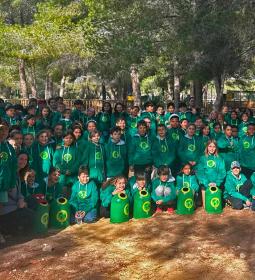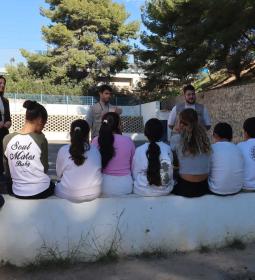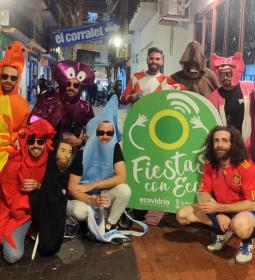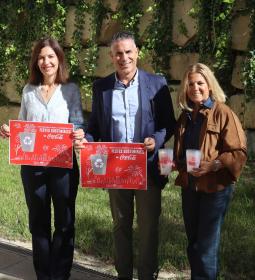Among the waste that shows the greatest increase are electrical and electronic equipment, fire extinguishers and dangerous gases in pressurized containers
Benidorm will increase selective waste collection in ecoparks by almost 15% in 2024

The city of Benidorm continues to increase its rates and percentages of waste segregation at source and selective collection year after year, both in the fixed eco-park and in the mobile eco-park that visits all the city's neighbourhoods weekly.
This is reflected in the data managed by the Department of the Environment, the balance of which was released today by the councillor for the department, Mónica Gómez. It indicates that during 2024, this service increased the selective collection of all types of waste not deposited in ordinary containers located on public streets by almost 15%, exceeding 4.5 million kilograms compared to 3.9 million kilograms the previous year.
Mónica Gómez pointed out that among the waste that registered the greatest increase last year were electrical and electronic devices, fire extinguishers, and hazardous gases in pressurized containers. Specifically, electrical and electronic devices increased from 45,656 kilos in 2023 to a total of 88,445 in 2024; fire extinguishers increased from 115 to 1,830; and gases in pressurized containers containing hazardous substances increased from 245 to 2,720 during this same period. The councillor explained that these figures reflect "the significant progress we are making in terms of eco-park activity and also in terms of raising awareness among citizens and the local productive sector about the importance of separating and depositing certain waste in the appropriate spaces for proper treatment and disposal."
The councillor also explained that, as usual, "the type of waste that accounted for the largest percentage of collection was debris, with 3,985,660 kilos collected last year," which is nearly half a million kilos more than in 2023. Similarly, residents also brought 84,500 kilos of metals to the eco-park; 149,140 kilos of pruning waste; 2,245 kilos of vegetable oil; and 1,008 kilos of toner cartridges.
Also collected were 1,341 kilos of fluorescent tubes; 285 kilos of empty aerosol cans; 640 kilos of contaminated plastic containers; 95 kilos of X-rays; 111,760 kilos of flat glass; 1,100 kilos of button batteries; 93,600 were collected from appliances containing pollutants or chemicals used primarily in refrigeration and air conditioning systems, such as CFCs, HCFCs, HC, or NH3. Finally, the 2024 balance also shows the collection of 1,290 kilos of absorbents and cleaning cloths and another 16,152 kilos of waste such as paints, inks, and/or varnishes.
Mónica Gómez, Councilor for the Environment, stated that "the population is gradually becoming aware of the importance of separating waste" and expressed her conviction that "these percentage increases will continue to grow in the coming years." Therefore, she thanked citizens, businesses, and small self-employed workers for their "collaboration in this work of environmental protection, which is increasingly important and also increasingly consolidated in our city," and encouraged them to "continue along this path."
What items can I recycle in the eco-park?
The Environment Councilor reminded residents that use of this eco-park service, both landline and mobile, is free of charge and encouraged them to use it to contribute to environmental protection. The waste reception and management point is located in the Foia del Ca district, on Finestrat Road, next to the urban solid waste transfer plant and the lightweight packaging plant.
Anyone can bring any item they wish to dispose of and that is on the list of admissible items to this space for recycling. This ranges from ordinary waste (such as cardboard, glass, plastics, wood, or metals) to bulky waste (such as furniture, mattresses, appliances, or pruning waste).
Likewise, among the accepted items, there is also a space for the collection of hazardous waste, such as crankcase oil, car batteries, batteries, expired medications, aerosols, X-rays, fluorescent tubes, or metal or plastic containers that have contained up to 30 kilograms of hazardous materials.
Items not accepted at this waste treatment plant include household waste, tyres, containers with more than 30 kg of hazardous materials, or infectious or radioactive waste.
The mobile eco-park is a special vehicle equipped to deposit certain items for separate collection. These include used cooking and automotive oil, button and electric batteries, X-rays, small electronic devices (cell phones, radios, etc.), or small toxic containers, such as hairspray or spray cans, travelling to a different neighbourhood in the city each weekday. This service has also been reinforced this year with the Consorci MARE mobile eco-park, which also makes stops in our city.
All information on the dates and times of the park's operations in each of Benidorm's neighbourhoods is available by clicking on the following link:
https://benidorm.org/es/ayuntamiento/concejalias/medio-ambiente/reciclaje/ecoparque-movil




